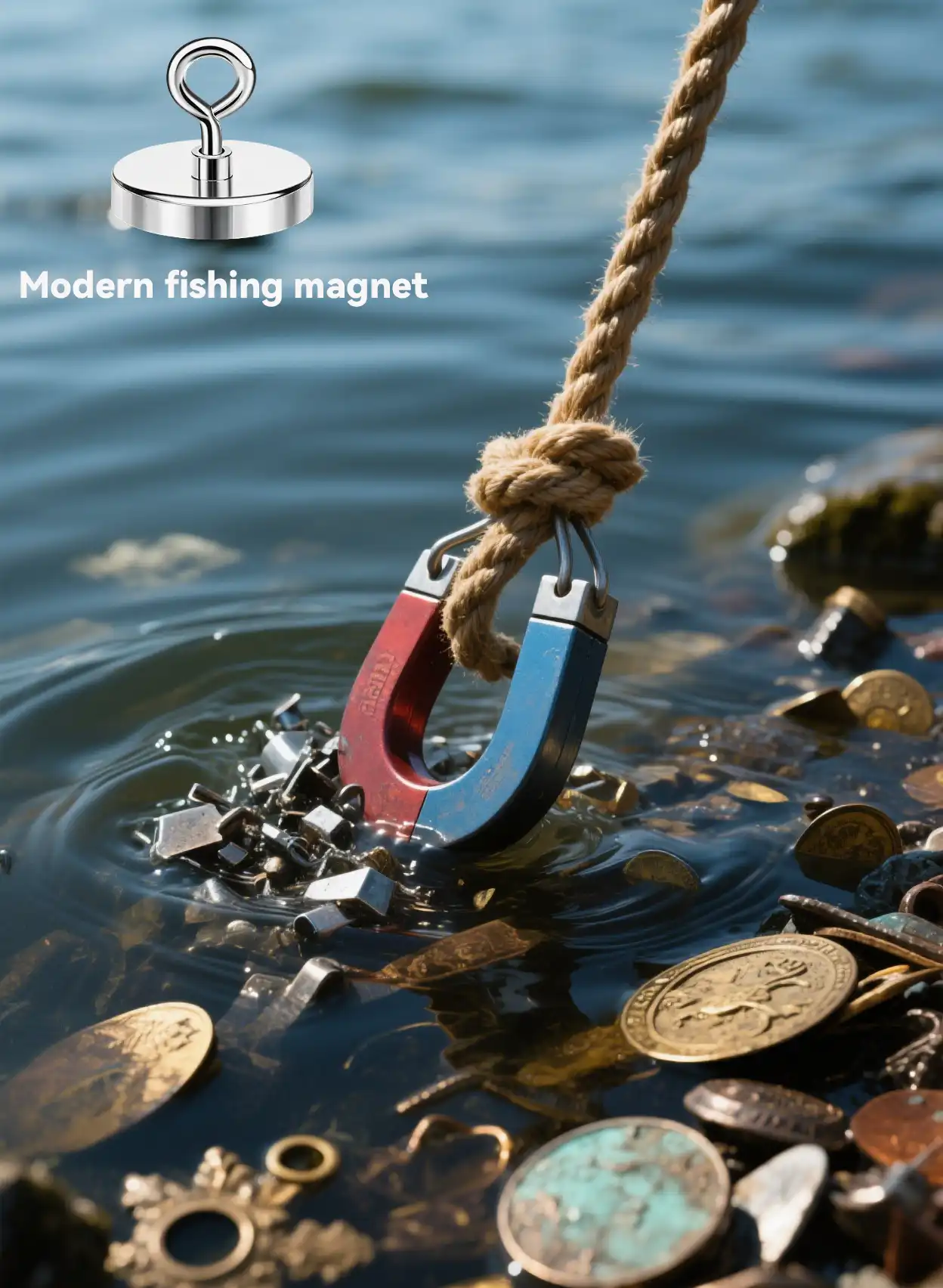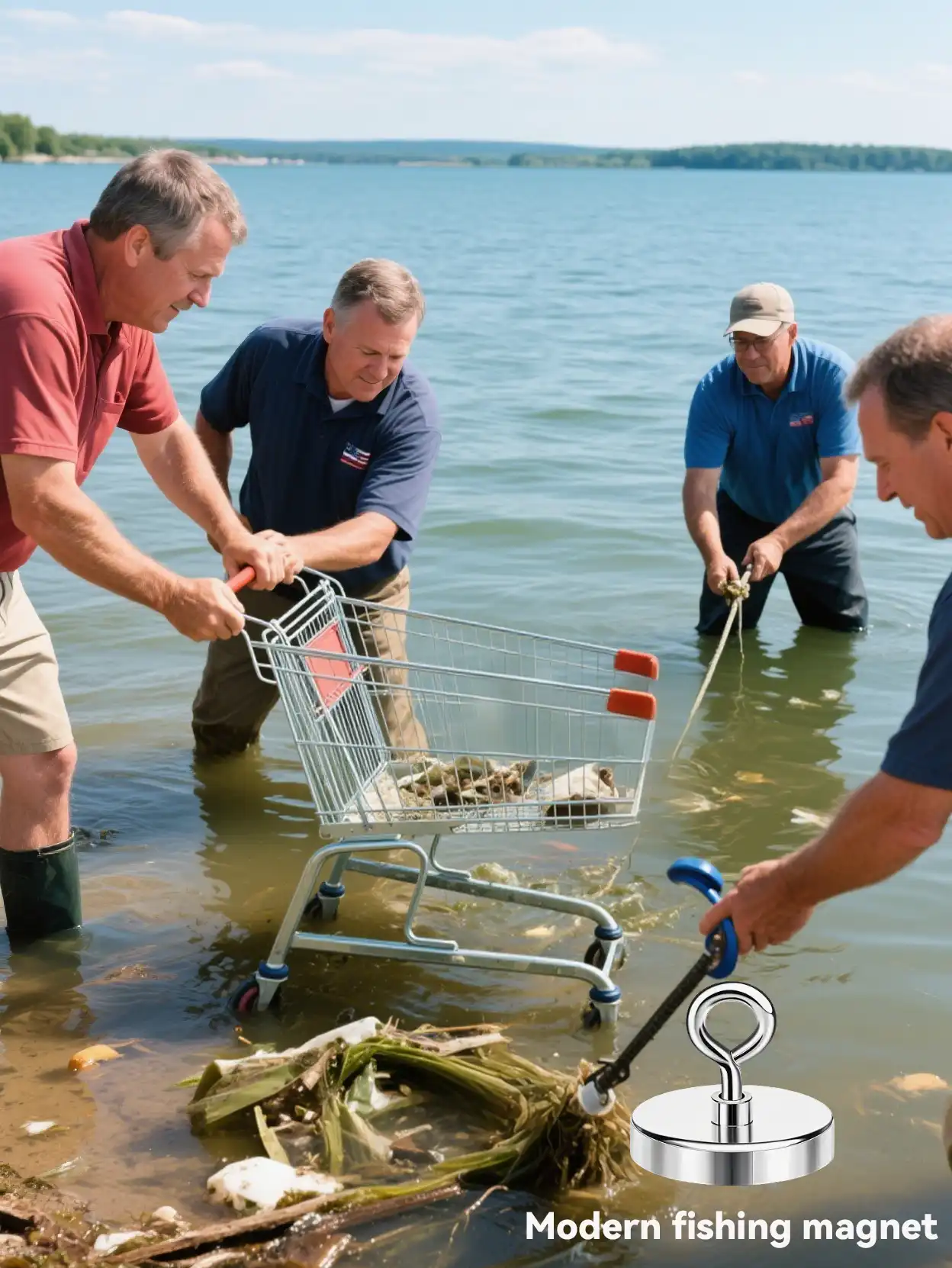What is magnet fishing?
Tie a rope to a magnet and throw it into the water. The magnet absorbs metal and you will get a lot of unexpected things. This is an exploration of the unknown and as fun as treasure hunting. You may find antiques from hundreds of years ago. A key with special meaning? A token of love lost by a sad person? It’s fun to think about it. It can satisfy curiosity, explore the unknown, and gain surprises. This is why magnet fishing is becoming more and more popular, but is it legal? What are the different regulations and restrictions in different countries?

Is Magnet Fishing Legal or Illegal?
In short, in the United States, apart from South Carolina, which is the only state that bans magnet fishing, magnet fishing is allowed in other states, but there are different regulations for the artifacts found, and illegal trespassing is prohibited, which is not allowed in British canals. Magnet fishing is allowed, with no restrictions on private waters。
Magnet Fishing Laws in the USA
Alabama: In Alabama, there are no specific laws prohibiting magnet fishing, but general rules regarding trespassing and removing property from waterways must be followed; historical artifacts are defined as archaeological objects over 100 years old, and it is prohibited to remove artifacts from state waters.
Alaska: In Alaska, magnet fishing is permitted in public waterways, and artifacts predating European settlement are protected under state law.
Arizona: In Arizona, there are no specific magnet fishing laws, but it is allowed with permission on private property; "antiquities" refers to artifacts over 75 years old related to Native American history.
Arkansas: In Arkansas, magnet fishing is legal unless expressly prohibited, and historic artifacts are defined as those predating the 1803 Louisiana Purchase.
California: In California, magnet fishing is allowed in navigable public waterways, but it is unlawful to remove artifacts of any age from state waters.
Colorado: In Colorado, magnet fishing must avoid trespassing on private property, and archaeology refers to artifacts over 200 years old.
Connecticut: In Connecticut, magnet fishing is allowed in public waterways, where historic artifacts are defined as those predating 1783.
Delaware: In Delaware, there are no specific magnet fishing laws, but the state follows federal definitions regarding historic archaeological finds.
Florida: In Florida, magnet fishing is allowed in navigable state waters, and historic artifacts are defined as those over 50 years old.
Georgia: In Georgia, there are no laws prohibiting magnet fishing in public waterways, and the state protects artifacts predating European colonization.
Hawaii: In Hawaii, magnet fishing is generally allowed in public areas, and historic artifacts are defined as those predating 1778.
Idaho: In Idaho, magnet fishing is permitted in public waterways, but it is unlawful to remove "antiquities" from public lands.
Illinois: In Illinois, magnet fishing is allowed except it is prohibited by local laws, but there are restrictions on removing artifacts from rivers and lakes.
Indiana: In Indiana, magnet fishing is permitted in public waterways, where historic artifacts over 50 years old are protected.
Iowa: In Iowa, magnet fishing is allowed except where expressly prohibited, but the state prohibits removing undefined "cultural artifacts."
Kansas: In Kansas, magnet fishing is allowed except where prohibited, and the state protects archaeological sites from disturbance.
Kentucky: In Kentucky, there are no magnet fishing laws, but the state broadly protects pre-modern archaeological artifacts.
Louisiana: In Louisiana, magnet fishing is generally allowed in public waterways, where artifacts over 100 years old are protected.
Maine: In Maine, magnet fishing is permitted in great ponds and navigable rivers, and the state follows federal definitions for archaeological finds.
Maryland: In Maryland, magnet fishing is allowed in public waterways, but it is unlawful to remove historic artifacts from state waters.
Massachusetts: In Massachusetts, permission is required for magnet fishing in inland waterways, and the state protects archaeological artifacts over 100 years old.
Michigan: In Michigan, magnet fishing is allowed except where expressly prohibited, and the state protects artifacts over 100 years old.
Minnesota: In Minnesota, magnet fishing is allowed except in protected areas, and the state defines archaeology as objects over 50 years old.
Mississippi: In Mississippi, there are no magnet fishing laws, but the state prohibits removing artifacts from public waters.
Missouri: In Missouri, there are no magnet fishing laws, but the state defines historic artifacts as those over 100 years old.
Montana: In Montana, magnet fishing is allowed with restrictions in certain waterways and protects archaeological finds over 100 years old.
Nebraska: In Nebraska, magnet fishing is permitted in most public waterways, and archaeology refers to objects over 150 years old.
Nevada: In Nevada, there are no magnet fishing laws, but the state broadly protects historic and prehistoric artifacts.
New Hampshire: In New Hampshire, magnet fishing is allowed except where prohibited, but the state prohibits removing undefined "objects of antiquity."
New Jersey: In New Jersey, magnet fishing is permitted in navigable waters, but the state prohibits removing artifacts from state property.
New Mexico: In New Mexico, there are no magnet fishing laws, but the state protects artifacts predating European colonization.
New York: In New York, magnet fishing is generally allowed except where prohibited, but the state restricts the removal of artifacts over 100 years old.
North Carolina: In North Carolina, magnet fishing is permitted in navigable public waters, and historic artifacts predate 1790.
North Dakota: In North Dakota, there are no magnet fishing laws, but the state prohibits removing artifacts from public waters.
Ohio: In Ohio, magnet fishing is allowed except where prohibited, and the state protects archaeological objects from registered sites.
Oklahoma: In Oklahoma, there are no magnet fishing laws, but the state defines historic artifacts as those predating December 31, 1842.
Oregon: In Oregon, magnet fishing is permitted in most public waterways, but the state protects pre-written history archaeological finds.
Pennsylvania: In Pennsylvania, magnet fishing is allowed except where prohibited, and the state protects artifacts over 100 years old.
Rhode Island: In Rhode Island, magnet fishing is permitted in public waters with some exceptions, and the state broadly protects historic artifacts.
South Carolina is the only state that has outlawed magnet fishing. Its Underwater Antiquities Act, passed in 1991, makes it illegal to "harvest any archaeological artifacts from state waters without a license." And these licenses aren't easy to come by. To legally magnet fish in South Carolina, the University of South Carolina states that you need a Hobby License. However, the state and its Institute for Archeology and Anthropology (SCIAA) don't give licenses for this hobby. The university goes as far as to call it a "potentially destructive practice."

South Dakota: In South Dakota, there are no magnet fishing laws, but the state prohibits removing undefined "objects of antiquity."
Tennessee: In Tennessee, there are no magnet fishing laws, but the state protects artifacts over 100 years old.
Texas: In Texas, magnet fishing is allowed in navigable public waters, with broad protection for cultural artifacts and antiquities.
Utah: In Utah, magnet fishing is permitted except where prohibited, and the state protects archaeological objects over 100 years old.
Vermont: In Vermont, magnet fishing is allowed in public waterways, but the state prohibits removing undefined "objects of antiquity."
Virginia: In Virginia, magnet fishing is permitted except where prohibited, with broad protection for archaeological artifacts.
Washington: In Washington, magnet fishing is allowed in navigable public waters, and the state protects archaeological objects over 100 years old.
West Virginia: In West Virginia, there are no magnet fishing laws, but the state prohibits taking artifacts from state lands.
Wisconsin: In Wisconsin, special permits are required for magnet fishing in most waterways, and the state protects archaeological sites and objects.
Wyoming: In Wyoming, there are no magnet fishing laws, but the state broadly protects artifacts.
Although magnet fishing is allowed in public waters in most states, artifacts cannot be taken away and are protected by state law; magnet fishing on private property requires permission from the landowner, and if you are harvesting something other than Cultural relics, but guns, grenades and the like, must pay special attention to safety to avoid danger. For now, calling the police as soon as possible is still the safest way.
Magnet Fishing Laws in the UK
In the UK, if you ask the Canal & River Trust (formerly British Waterways until 2012), they will tell you that they “don’t allow magnet fishing as it can be extremely dangerous.” The trust’s General Canal Byelaws of 1965 states that, “No person unless authorised by the Board in that behalf or otherwise legally entitled so to do shall: (d) Dredge or remove coal or other material from any canal. “
Here’s a snippet from the referenced Byelaws:
Magnet Fishing Laws General Canal Byelaws 1965
Reminders To Stay on the Right Side of the Law
Just remember the following points to make sure that you’re enjoying the hobby without breaking any laws:
Safety first for you and other people
Guns, ammo, grenades, bombs, and other weapons should be reported to the police
Be kind to the environment – clean up rubbish, and take your finds with you
Get authorization first before going magnet fishing on private property
Follow the laws
Use good common sense
Luckily, the law doesn't extend to private waters. As long as you own it or get permission from the owner, you can fish in any privately owned body of water.
Is magnet fishing good?
On the good side, magnet fishing could positively impact the environment. YouTuber Bryce of Outdoors Weekly posted a video where hundreds of pounds of shopping carts were pulled out of one area in only a few hours, thus, ultimately cleaning up his local body of water and making it safer for marine life to thrive.

On the bad side, it's dangerous. That same mystery fishers love can be the very reason why you need to be careful. Guns, bombs, literally anything can be tossed in a body of water, and if you don't know how to handle these things, you could harm yourself or others.

 Deutsch
Deutsch Русский
Русский Español
Español Français
Français 한국어
한국어 日本語
日本語
